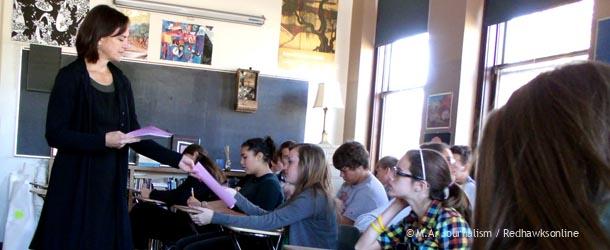Short-term benefits associated with cheating produce long-term repercussions
“No cheating, no chatting,” said English teacher Robyn Westrem with a smile as she slid a quiz onto the desk of each student. After a few deep breaths, the scratch of pencils reached the ears of each student as they tested themselves not only in vocabulary, but also in ethics.
In the last year, several cases of cheating among students at competitive schools, such as Harvard University and Stuyvesant high school in Manhattan, have surfaced. Experts are now saying that high achieving students are just as likely to cheat as other students.
In her classroom, Westrem uses her “no cheating, no chatting” catch phrase before every quiz or test to remind students of her expectations of them, though she believes that cheating is not a premeditated act.
“I think that what happens when students cheat is maybe a time crunch,” said Westrem. “People don’t set out to cheat, but they just get into a tough situation, which is not an excuse, but it’s an understandable reason.”
However, math teacher Scott Scholl believes otherwise.
“A kid that’s going to cheat is going to cheat regardless of what the teacher says,” said Scholl.
Scholl also sees a student’s level of achievement as irrelevant to their likelihood of cheating.
“It’s more about moral character than achievement,” said Scholl. “Someone with a low moral character is probably going to cheat just as much as another person with low moral character [regardless] of their achievement factor.”
Junior Poppy Anema believes in the value of honest work and doesn’t see any advantage in cheating.
“It’s best to prepare,” said Anema. “If you cheat, it’s going to come back to bite you, especially in AP classes. Essentially, even if you knew what was going to be on the test before [you took it], you have to understand [the material]. Your focus shouldn’t be to get the points. It should be to learn, and getting the points should be an outcome of learning.”
Professor Donald L. McCabe of Rutgers University has conducted numerous surveys on cheating with college and high school students for over 20 years. Having surveyed more than 200,000 students, McCabe has gathered information about why students cheat and how they view different types of cheating.
“There have always been struggling students who cheat to survive,” McCabe told New York Times. “But more and more, there are students at the top who cheat to thrive. I don’t think there’s any question that students have become more competitive, under more pressure, and, as a result, tend to excuse more from themselves and other students, and that’s abetted by the adults around them.”
McCabe finds that adults have a large impact on the choices of students.
“I think kids today are looking to adults and society for a moral compass,” he said, “and when they see the behavior occurring there, they don’t understand why they should be held to a higher standard,”
College counselor Richard Harris agrees that adults do not always set the correct example for younger generations.
“There are a lot of cases where adults have cheated and have benefitted short term because of it,” said Harris. “It’s a pervasive problem. You see cheating in sports a lot of times, where people take steroids, and you see it in the corporate world, where [people] cheat on the stock market to a certain degree, so cheating is definitely not just a high school student thing.”
Despite this, Harris believes students know what decisions they should make.
“I think that you’d be hard pressed to find a student that didn’t know the definition of cheating,” said Harris. “Teachers explain it really, really clearly at the beginning of the year, as to what cheating is, plagiarizing is, and many students take the incorrect path. People believe that doing something unethical in the short term will pay off in the long term, but that is rarely the case.”
Senior Becca Lundberg finds Minnehaha to be an ethical school and also thinks that students know what is expected of them.
“I think most people strive to be academically honest,” said Lundberg.
Everyday, students make the decision of whether or not to cheat. Each time the bell rings, a new opportunity presents itself. Whether it be on a small homework assignment or on the biggest test of the semester, it’s a question students ask themselves time and time again, and a choice only they can make.
“I think [teachers] are pretty clear about their expectations,” said Lundberg. “Minnehaha students are smart enough to know what is and isn’t cheating.”

